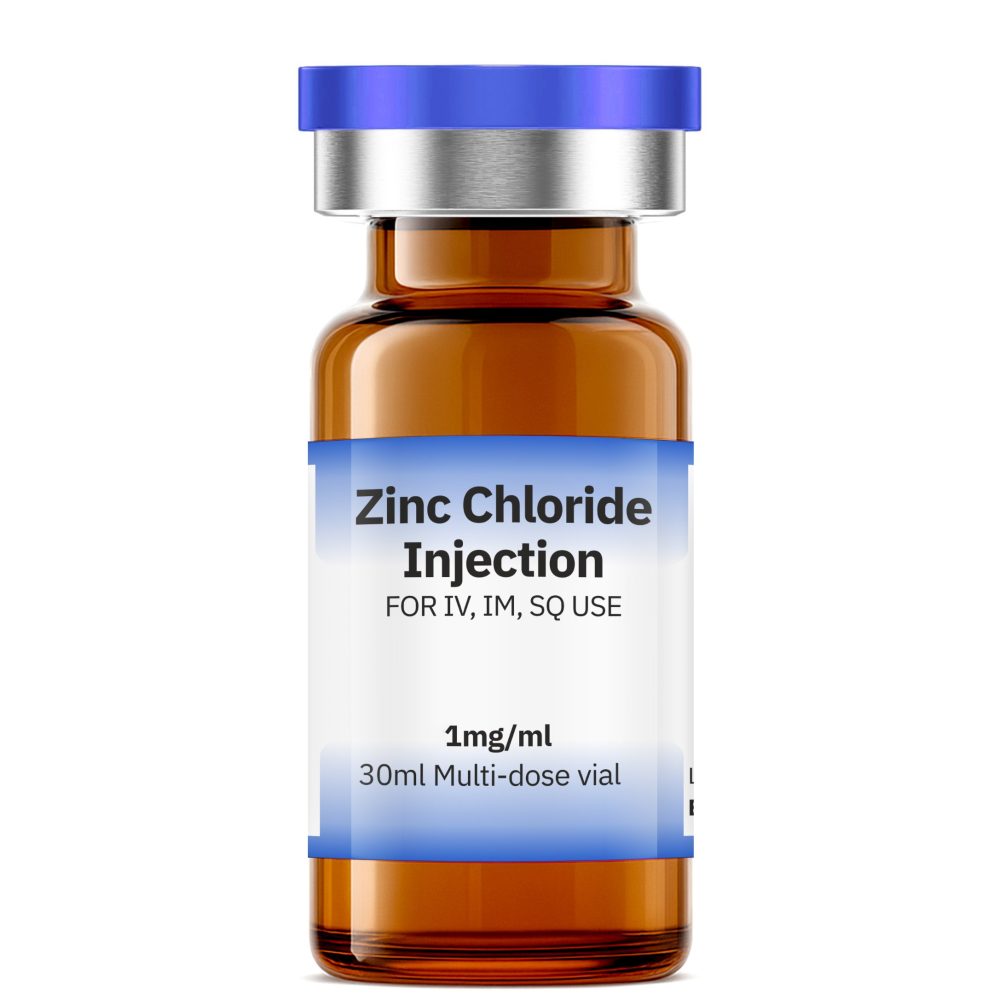
Zinc Chloride 10mg/ml (Preservative-free)
Zinc chloride injection is a sterile solution used as an additive to intravenous solutions for total parenteral nutrition (TPN). It helps maintain adequate zinc levels in the body, which is essential for various bodily functions, including wound healing, growth, and maintaining normal skin hydration [1][2].
Each milliliter of the solution typically contains 1 mg of zinc, and it is administered intravenously after dilution [1][2]. Zinc is a crucial trace mineral that acts as a cofactor for over 70 different enzymes [1].
Available to ship to your site 6-8 weeks after ordered
-
10mL
-
1mg/ml
Zinc chloride injection should be administered intravenously only after proper dilution. Here are the key steps for its administration:
Dilution: The zinc chloride solution must be diluted in a volume of fluid not less than 100 mL. Common diluents include 5% glucose injection or 0.9% sodium chloride injection [9][6].
Dosage:
Adults: For a metabolically stable adult receiving total parenteral nutrition (TPN), the recommended dosage is 2.5 to 4 mg of zinc per day (2.5 to 4 mL of the solution per day). In acute catabolic states, an additional 2 mg of zinc per day (2 mL of the solution per day) is suggested [9][6].
Children: For full-term infants and children up to 5 years of age, the recommended dosage is 100 mcg of zinc per kg of body weight per day (0.1 mL/kg/day). For premature infants up to 3 kg in body weight, the dosage is 300 mcg of zinc per kg of body weight per day (0.3 mL/kg/day) [9].
Administration: The diluted solution is typically administered via intravenous infusion over a period of 8 to 24 hours [10]. -
Zinc chloride plays several crucial roles in the body, primarily through its involvement in various enzymatic processes. Here’s a breakdown of its mechanism of action:
Catalytic Role: Zinc acts as a cofactor for numerous enzymes, facilitating various biochemical reactions [3].
Structural Role: It helps stabilize the structure of proteins and cell membranes [3].
Regulatory Role: Zinc is involved in gene expression and cellular signaling pathways [3].
Additionally, zinc chloride has cytoprotective properties, protecting cells from damage caused by reactive oxygen species (ROS). It achieves this through the action of metallothioneins, which are proteins that bind heavy metals and help in detoxification [3].
-
Contraindications
Direct Injection: Direct intramuscular or intravenous injection of zinc chloride is contraindicated due to its acidic pH, which can cause significant tissue irritation [4].
Allergies: It should not be used in individuals who are allergic to zinc, zinc chloride, or any of the ingredients in the formulation [5].
Precautions
Kidney Disease: Patients with severe kidney disease may need to reduce or omit zinc doses, as zinc is primarily eliminated through the urine [4].
Copper Deficiency: Long-term use of zinc products can lead to copper deficiency, which may result in anemia and other blood disorders. Monitoring and possibly supplementing copper may be necessary [4].
Aluminum Toxicity: The product contains aluminum, which can accumulate to toxic levels, especially in patients with impaired kidney function, including premature neonates [4].
-
Drug Interactions
Moderate Interactions: There are 7 moderate drug interactions. These typically require caution and may need dose adjustments or special monitoring [6].
Minor Interactions: There are 92 minor drug interactions. These are less likely to cause significant issues but should still be monitored [6].
Common Interacting Drugs
Some of the drugs that may interact with zinc chloride include:
Aspirin
Diphenhydramine (Benadryl)
Loratadine (Claritin)
Acetaminophen (Tylenol)
Fish Oil (omega-3 polyunsaturated fatty acids) [6].
Disease Interactions
Renal Dysfunction: Patients with kidney issues may need dose adjustments due to the risk of zinc accumulation [6].
Malabsorption Syndromes: Conditions that affect nutrient absorption can alter zinc levels and its effectiveness [6]. -
Common Side Effects
Tiredness, headaches, shortness of breath during exercise, dizziness, pale skin [5]
Serious Side Effects
Allergic Reactions: Symptoms may include rash, hives, itching, swelling of the face, lips, tongue, or throat, and difficulty breathing [6].
Anemia: Low red blood cell count, which can cause fatigue and weakness [5].
Low Blood Pressure: Can lead to dizziness and fainting [5].
Copper Deficiency: Long-term use can lead to low levels of copper in the blood, which may require monitoring and supplementation [5].
Pulmonary Edema: Fluid accumulation in the lungs, which can cause difficulty breathing [7].
Rare Side Effects
Dyspepsia: Indigestion or upset stomach [7].
Hypotension: Abnormally low blood pressure [7].
Jaundice: Yellowing of the skin or eyes [7].
Leukopenia: Low white blood cell count, increasing infection risk [7].
Neutropenia: A specific type of low white blood cell count [7].
-
Use in Nursing Mothers: Caution is advised when administering zinc chloride to nursing women, as it is not known whether it is excreted in human milk [4].
The use of zinc chloride injection during pregnancy should be approached with caution. Here are some key points to consider:
Lack of Animal Studies: Animal reproduction studies have not been conducted with zinc chloride [4][6].
Unknown Effects: It is not known whether zinc chloride can cause fetal harm when administered to a pregnant woman or affect reproductive capacity [4][6].
Use Only If Necessary: Zinc chloride should be given to a pregnant woman only if clearly needed [4][6].
-
Zinc chloride injection should be stored at controlled room temperature, specifically between 20°C to 25°C (68°F to 77°F)12. It’s important to keep the vial intact and protect it from light and moisture to maintain its stability and effectiveness [2][8].
-
1. dailymed.nlm.nih.gov 2. rxlist.com 3. go.drugbank.com
4. pfizermedicalinformation.com 5. nps.org.au 6. drugs.com 7. medicine.com
8. bing.com 9. pfizermedicalinformation.com 10. medsafe.govt.nz


